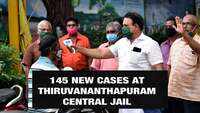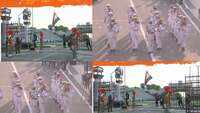
Thiruvananthapuram: Police have come up with justification for retrieving call detail records (CDRs) of Covid-19-affected citizens quoting laws and judgments. However, the justification squarely contradicts Union home ministry’s answer provided in the Lok Sabha last year, on a question on illegal access of CDRs of individuals.
The official statement of the state police has now openly challenged the stand held by both the Centre and the latest judgments of the Supreme Court. “The contents of telephone calls are not being collected as part of the CDR collection. For the same reason, the section 5 (2) of the Indian Telegraph act is not applicable here,” the statement issued by the state police, justifying the retrieval of CDRs for preparing route maps of Covid-19-affected citizens, said.
However, this has turned out to be in complete contravention to rules that govern retrieval of CDRs issued by the Centre. In a reply by the then Union minister of state for home affairs (in reply to an un-starred question number 1447 by Santhosh Ahlawat) Hansraj Gangaram Ahir in Lok Sabha on February 12, 2019, the Centre said that “ministry of home affairs has issued guidelines in 2016 for seeking CDRs under the statutory provisions contained in section 92 of the CrPC 1973, or the section 5 (2) of the Indian Telegraph Act, read with rule 419A of the Indian Telegraph Amendment Rules, 2007,” thereby clarifying that the CDRs are not only retrieved under section 5 (2) of the act, but should also be read with rule 419A of the rules framed in 2007.
According to section 5(2) of the Indian Telegraph Act, 1885, the central or state governments can retrieve CDRs of an individual only in the interest of maintaining the sovereignty and integrity of India, the security of the state, affecting friendly relations with foreign states or public order or for preventing incitement to the commission of an offence. Also, if CDRs are retrieved under section 92 of the CrPC, there should be a directive from the court to do so. Neither is applicable in the present case of CDR retrieval by the state police.
If CDRs are to be retrieved under both these sections, the police will have to follow the procedure laid out in rule 419A, under which permission can be given only by Union home secretary or the state home secretary. In exceptional circumstances, the order can be given by an officer not below the rank of joint secretary (or a police officer equal to the rank of IG). But the competent higher authority should be informed within three days of such interception and clearance has to be obtained from the authority within seven days, failing which the activity —message interception or CDR retrieval— will be invalid. “Even in matter of laws relating to criminal justice administration, there is a statutorily-maintained institutional mistrust about the police which successive law commissions have refused to alter. It is not that CDRs cannot be retrieved at all, but it can be done only in cases stipulated by law and by following laid out procedures,” former law secretary B G Harindranath said.
The defense by police also claims that Puttaswamy judgment of Supreme Court itself says that measures taken to prevent an epidemic, like Covid-19, cannot be considered as a violation of privacy. The judgment in K S Puttaswamy versus Union of India ruled on the contrary, and insisted on procedures to be followed while declaring right to privacy as a fundamental right. Supreme Court had earlier, in Vinit Kumar versus CBI case, said that procedure under section 5(2) of the telegraph act is sinequanon.
The official statement of the state police has now openly challenged the stand held by both the Centre and the latest judgments of the Supreme Court. “The contents of telephone calls are not being collected as part of the CDR collection. For the same reason, the section 5 (2) of the Indian Telegraph act is not applicable here,” the statement issued by the state police, justifying the retrieval of CDRs for preparing route maps of Covid-19-affected citizens, said.
However, this has turned out to be in complete contravention to rules that govern retrieval of CDRs issued by the Centre. In a reply by the then Union minister of state for home affairs (in reply to an un-starred question number 1447 by Santhosh Ahlawat) Hansraj Gangaram Ahir in Lok Sabha on February 12, 2019, the Centre said that “ministry of home affairs has issued guidelines in 2016 for seeking CDRs under the statutory provisions contained in section 92 of the CrPC 1973, or the section 5 (2) of the Indian Telegraph Act, read with rule 419A of the Indian Telegraph Amendment Rules, 2007,” thereby clarifying that the CDRs are not only retrieved under section 5 (2) of the act, but should also be read with rule 419A of the rules framed in 2007.
According to section 5(2) of the Indian Telegraph Act, 1885, the central or state governments can retrieve CDRs of an individual only in the interest of maintaining the sovereignty and integrity of India, the security of the state, affecting friendly relations with foreign states or public order or for preventing incitement to the commission of an offence. Also, if CDRs are retrieved under section 92 of the CrPC, there should be a directive from the court to do so. Neither is applicable in the present case of CDR retrieval by the state police.
If CDRs are to be retrieved under both these sections, the police will have to follow the procedure laid out in rule 419A, under which permission can be given only by Union home secretary or the state home secretary. In exceptional circumstances, the order can be given by an officer not below the rank of joint secretary (or a police officer equal to the rank of IG). But the competent higher authority should be informed within three days of such interception and clearance has to be obtained from the authority within seven days, failing which the activity —message interception or CDR retrieval— will be invalid. “Even in matter of laws relating to criminal justice administration, there is a statutorily-maintained institutional mistrust about the police which successive law commissions have refused to alter. It is not that CDRs cannot be retrieved at all, but it can be done only in cases stipulated by law and by following laid out procedures,” former law secretary B G Harindranath said.
The defense by police also claims that Puttaswamy judgment of Supreme Court itself says that measures taken to prevent an epidemic, like Covid-19, cannot be considered as a violation of privacy. The judgment in K S Puttaswamy versus Union of India ruled on the contrary, and insisted on procedures to be followed while declaring right to privacy as a fundamental right. Supreme Court had earlier, in Vinit Kumar versus CBI case, said that procedure under section 5(2) of the telegraph act is sinequanon.

Coronavirus outbreak
Trending Topics
LATEST VIDEOS
City
 145 inmates test positive in a day, Thiruvananthapuram central prison remains Covid-19 hotbed
145 inmates test positive in a day, Thiruvananthapuram central prison remains Covid-19 hotbed  Hundreds of birds injured due to banned manjha on Independence Day in Delhi
Hundreds of birds injured due to banned manjha on Independence Day in Delhi  Karnataka: Terrifying abduction of a woman in broad daylight caught on cam
Karnataka: Terrifying abduction of a woman in broad daylight caught on cam  Independence Day 2020: Beating retreat ceremony at Attari-Wagah Border as a part of celebrations
Independence Day 2020: Beating retreat ceremony at Attari-Wagah Border as a part of celebrations
More from TOI
Navbharat Times
Featured Today in Travel
Quick Links
Kerala Coronavirus Helpline NumberHaryana Coronavirus Helpline NumberUP Coronavirus Helpline NumberBareilly NewsBhopal NewsCoronavirus in DelhiCoronavirus in HyderabadCoronavirus in IndiaCoronavirus symptomsCoronavirusRajasthan Coronavirus Helpline NumberAditya ThackerayShiv SenaFire in MumbaiAP Coronavirus Helpline NumberArvind KejriwalJammu Kashmir Coronavirus Helpline NumberSrinagar encounter
Get the app



